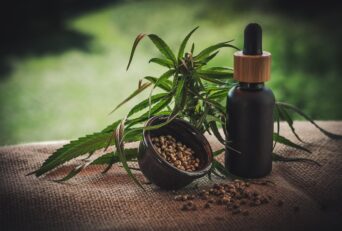Abdominal colic is one of the most annoying problems of a baby . Colic isn’t amusing for baby, and it certainly is no amusement for parents, either. New parents often do not understand the true cause of a crying baby.
Although there is no point remedy that’s guaranteed to stop the crying, but doctors (and lots of new parents) do sometimes suggest gripe water to parents who are desperate for something that can help relieve an unpleasant period of crying.
Initially, it was used extensively by the English grannies in 1850, later it gathered fame in the USA where it was graithed from bicarbonate, ginger, dill, fennel, alcohol and chamomile.
Table of Contents
What Is Gripe Water?
Gripe water is an over the counter home remedy which is a liquid supplement of sodium bicarbonate and herbs (such as dill, ginger, cinnamon, cardamom, clove, chamomile, liquorice, fennel, lemon balm or peppermint, depending on the formula)and is intended for the treatment of colic and constipation in infants.
In addition to relieving colic, it’s suggested as a remedy for teething pain, hiccups and flatulence, among other ailments. Traditionally, gripe water was for graithed from alcohol, dill seed oil and sodium bicarbonate.
But nowadays alcohol is not generally used in manufacturing gripe water, but sodium bicarbonate still remains the active ingredient in ample of gripe water brands.
However, one should choose for gripe water that is natural and made of organic herbs. Cardamom, lemon balm, ginger and fennel are the popular herbs from which gripe water is prepared along with glycerin that lends it a sweet taste.
Why Is Gripe Water Used?
Colic is a very discomforting situation for the baby as well as the mother. The effectiveness of gripe water can be traced only in relieving colic in babies, and has been used since very long time now.
If the baby is crying due to colic, consumption of gripe water is useful but if the suffering baby is not relieved even after consuming gripe water, then there is no doubt in it that the cause is something else. Hence, without any delay, consulting the paediatrician for advice is the best alternative.
How Does Gripe Water Work?
Even though there is very few scientific evidence which shows that gripe water effectively soothes colic, ample of parents swear by it.
The original gripe water was first used by grandmas and mums in England in the 1850s and it incorporated alcohol, which people thought relaxed babies (but today we know that giving any alcohol to a baby is not at all sensible.).
Nowadays, a few people say dill liquorice, ginger and fennel relieve the gas and stomach discomfort that are believed to be a cause of colic.
Experts, on the other hand, think gripe water might work simply because it has a sweet taste. Natural gripe water is prepared from herbs like aloe vera, ginger, cardamom, chamomile, dill, lemon balm, anise seeds, fennel, purified water and glycerin – all of which help in relieving stomach discomfort in babies.
Gripe water helps in the digestion, soften the muscles, and makes the baby feel soothed if he or she is having gas troubles. The gripe water helps in freeing the gas and wind.
Ingredients Of Gripe Water
Ingredients of gripe water are dependent on the brand and country of the production. They can include the following:
- Sodium Bicarbonate or more commonly baking soda (also known as ‘sarjikakshara’ in India)
- Deionized water
- Flavours like fennel, apple or others
- Preservatives: This category includes substances like sodium benzoate, bronopol, citric acid sodium methyl/propylparaben, potassium sorbate.
- Sweeteners: This includes sugar and vegetable glycerin
- Citrus bioflavonoid extract
Herb Extracts Or Oils
- Aloe or Aloe socotrina
- Biranjasipha or Yarrow or Achillea millefolium
- Blackthorn or Prunus spinosa
- Chamomile or Matricaria chamomilla
- Dill oil or Anethum Sowa or Anethum graveolens
- Ela or Cardamon or Elettaria cardamomum
- Fennel or Foeniculum vulgare
- Giloy or Guduchi or Tinospora cordifolia
- Ginger root or Zingiber officinale
- Himsra or Capparis spinosa
- Horsemint or Mentha silvestris
- Kasamarda or Cassia occidentalis
- Jhavuka or Saltcedar or Tamarix gallica
- Kasani or Cichorium intybus
- Lemon balm or Mellisa officinalis
- Pippali or Indian long pepper or Piper longum
- Punarnava or Boerrhavia diffuse
- Vegetable charcoal or Carbo vegetabilis
- In Europe, a certain rare ingredients are also used such as phenobarbital (a sedative) and alcohol.
What Is The Right Time To Giving Gripe Water To Baby?
Gripe water can be safe for babies over one-month-old. Since milk is the principal food of the baby, gastric trouble, flatulence, and bloating are not a big issue with babies. Gripe water is prepared from certain herbal ingredients which are effective in treating these tummy problems.
How To Give It To Your Baby?
The probable time to dope your baby with gripe water is during a feed or just after a feed because at this time his digestive system will start breaking down the large enzymes in milk, which can sometimes cause a spasm of the gut.
Make your baby sit upright and turn his/her head slightly to the side, then dope your baby with a clean medicine dropper or a child-friendly spoon.
Keep the dosage small at a time, granting time in between to prevent gagging or choking. If the baby appears to be gagging, stop doping immediately.
Which Brand Of Gripe Water Should You Buy?
Woodwards Gripe Water was the original medicine that helped relieve the discomfort associated with colic, but there are various other over the counter remedies too.
Brands, such as Infacol, Dentinox and Colief are also believed to relief colic and they have developed their own formula using the different combination of ingredients. Trial and error method can do the thing for finding the right one for your baby.
Benefits Of Gripe Water
There are some incidentals from people that gripe water can help in relieving colic or constipation problems in infants.
There is insufficient evidence though (no randomised controlled clinical trials) about the effectiveness of gripe water in the treatment of colic, hiccups, acid reflux, excessive gas, constipation, pain during teething or other problems in infants or adults.
Even if gripe water works, there is no supporting argument showing how it works. Some researchers believe that the result of soothing effect is due to the sweetness of the gripe water.
Is Gripe Water Safe?
The safety of gripe water clearly depends on the ingredients from which it is produced.
There are certain brands containing alcohol, which are clearly unhealthy for baby’s consumption. Its use for babies has been considered safe though people do debate over the presence of sodium bicarbonate in it.
Gripe water is not at all suitable newborns as their immune system is not strong enough to effectively fight against inevitable microbes.
Although some doctors do believe that gripe water is safe and not harmful when used for mild stomach problems. But it is not suited for treatment of severe colic.
A few incidents of infection were reported after the consumption of gripe water, they are:
- In 2004, according to a report, a 9 month old girl went through a septic shock after getting gripe water that was contaminated by bacterium Pseudomonas aeruginosa.
- According to 2007 report, the US Food and Drug Administration (FDA) reported a case in which a 6 week old infant was infected by a parasite Cryptosporidium after consuming gripe water.
- In 2009, FDA banned one brand of gripe water due to yeast contamination.
- A drop of blood acidity may be seen in the baby due continuous usage of gripe water that contains sodium bicarbonate.
Side Effects Of Gripe Water
A few possible side effects of gripe water were also reported. They are:
- Irritation in the intestines which can cause diarrhea
- Allergic reactions in some babies
Who Should Avoid Gripe Water?
- If a person or baby is allergic to any of the ingredients of gripe water, they should avoid it.
- People with gallstones, chronic heart failure, severe kidney problems with reduced urination, water retention, recent operation, blood clotting disorders and diabetes.
Tips For Using Gripe Water
If your doctor does prescribe you this supplement, follow these tips for picking the best (and probably the safest) gripe water:
- Read the ingredients list carefully.
- Avoid vegetable carbon (charcoal) if possible, as it may cause constipation.
- Only buy that product that is sucrose and alcohol free.
- Follow the instructions given with the supplement carefully.
- The instructions for use may change with brands as the ingredients of gripe water may not be the same, so before opening the box, make sure to read the label carefully.
- Certain brands recommend you to wait until your baby is at least 1 month old before use.
- Almost all brands vary when it comes to how long you should use the product, so be careful and read up the instructions before consuming the dosage.
- Even though gripe water should not cause an allergic reaction, but you should still watch out for symptoms of an allergy such as watering eyes, hives, itchiness, trouble swallowing or breathing, swelling of the lips or tongue, vomiting or diarrhea.
Tips For Giving Gripe Water To Babies
- Always consult a doctor before using gripe water for your baby and persist to the recommended dosage only.
- Try to avoid gripe water which contains traces of sodium bicarbonate as it can disturb the ph balance of baby’s stomach.
- Watch out for ingredients such as parabens, alcohol, gluten or dairy.
- Use gripe water that are forgraithed from natural herbals as they are the safer ones.
- Gripe water containing lycasin, a hydrogenated glucose syrup, does not cause tooth decay.
Alternatives To Gripe Water
Infants cry a lot and this is a normal behavior. This does not always mean that they have a stomach ache. They can also cry if they are cold, wet, hungry, hot or they just want you to play with them.
You should try these things before using gripe water
- Snuggle your baby close to your chest,
- Check your baby’s diaper from time to time,
- Feed your baby on demand and not on a clock schedule,
- Play relaxing music,
- Take your baby out for soothing walks,
- Rock your baby in a baby swing,
- At this age, baby is usually only good for some time, may be an hour after your baby is awake. If your baby has been awake for more than an hour, he/she may be crying because he/she may be tired.
- A quick cure for babies suffering from colic could be a simple change from standard cow’s milk formula to one that doesn’t contain cow’s milk.
- It has been found that hypoallergenic whey hydrolyzed formula helps in decreasing colic symptoms in babies, but also these hypoallergenic formulas cost three times as much as regular formulas.
- Give an infant massage. A nice, relaxing massage is a pleasant way to restrain colicky cries. It’s also a great opportunity for mother baby bonding.
- Wrap your little baby nice and tight in a warm blanket.
- Rock and dance while holding your baby in your arms for an extra pleasing sensation.
- Apply stomach pressure. Some babies find relief when pressure is placed on their tummies. To do this, just put your baby face down on your lap or sitting up on your lap with your baby’s belly against your hand, and then gently rub or pat your baby’s back.
- Distract your baby. Try to sing a song, even if you can’t hold a tune, your baby will probably still love it. (Sounds like ‘haa’ & ‘shh’ can also do the work).
- The calm, pleasing noise of a fan, a clothes dryer is also often soothing to babies (it reminds the baby of the womb).
You can also use Essential Oils For Babies to treat different problems that are faced by them.
You might have accumulated most of the information about gripe water, that what actually is gripe water, and what are the constituents of it, when is it used, what are it’s pros and cons, whether there are any alternatives to gripe water, etc.






